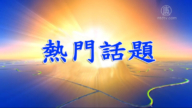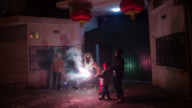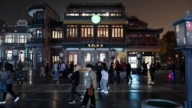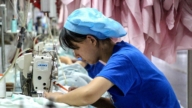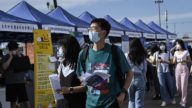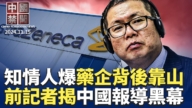【新唐人2013年05月10日訊】如果否定了毛澤東,中共的社會主義制度還能站得住嗎?中共國家主席習近平提出,如果中共在鄧小平「當時全盤否定了毛澤東,那中共就站不住了,站不住就會天下大亂。」但是,分析人士認為,毛澤東本身就是中國大亂的根源之一。下面就來聽聽專家的解析。
5月7號,中共黨史專家齊彪在大陸媒體發表文章說,今年1月5號,習近平在一個研討班上發表講話,他提出了「兩個不能否定」——「不能用改革開放後的歷史,否定改革開放前的歷史,也不能用改革開放前的歷史,否定改革開放後的歷史。」
文章披露,習近平還特別提及鄧小平堅決維護毛澤東,他強調﹕如果當時全盤否定了毛澤東,那中共還能站得住嗎?中共的社會主義制度還能站得住嗎?那就站不住了,站不住就會天下大亂。
時政評論員汪北稷指出,習近平提出「兩個不能否定」,是為了保護集權者的利益,延續中共獨裁體制所做的決定,既要保住那些毛左,也要利用相對開放的人來搞活經濟。汪北稷認為,習近平在走一條左右逢源的道路,既要改革開放,又要保住共產黨的獨裁專制。但是,中國大陸已經天下大亂。
時政評論員汪北稷:「毛澤東本身就是中國大亂的根源之一,毛澤東所依據的馬列共產主義思想,也是中共主導思想,也是中國亂源之一,所以是共產黨讓中華民族、中國大地一直在亂,49年建政之後屠殺人民,所謂三反、五反、四清一直到文化大革命,所以在它的階級鬥爭的旗幟下,80年之前中國一直是很亂。」
美國的「中國社會民主黨」中央委員會主持人劉因全指出,毛澤東統治下的極左思潮,瘋狂鎮壓地、富、反、壞、右,不但是中國的一場災難,也是世界的災難。劉因全認為,習近平應該否定毛澤東的倒行逆施。
旅美「中國社會民主黨」中央委員會主持人 劉因全:「但是呢,共產黨為了維護它的一黨專制,它擔心否定毛澤東的這一段統治以後,造成共產黨的垮臺,所以他們對這段時間,還是基本上肯定,這樣呢中國就一直沒辦法甩開歷史的包袱,走向文明社會,走向世界,我認為習近平應該正視這個問題。」
《九評共產黨》指出,1949年中共竊國後,在中共和毛澤東等歷代黨魁的殘酷邪惡統治下,中國進入了歷史最黑暗、民眾被大屠殺的時期,殺人是中共維系統治最必要手段之一,49年以後,中國有一半以上的人口受到過中共的迫害,估計有6,000萬到8,000萬人非正常死亡,超過人類兩次世界大戰死亡人數的總和。
汪北稷認為,在所謂的改革開放30多年裡,中國也非常亂。大規模的訪民、冤民流亡到全世界與中共政權抗爭。
汪北稷:「89年鎮壓了人民民主需求運動之後一直亂,一直到90年代,去鎮壓和平的、善良的信仰團體、法輪功群體,這個期間一直沒有停止鎮壓西藏同胞、新疆同胞、蒙古同胞還有國內的維權人士。如果89年中國真正的民主化了,貪官污吏清除了,進入一個民主的國家,中國法制不會亂,沒甚麼可亂的。」
汪北稷說,正確的作法應該是否定毛澤東、否定共產主義、否定中共這條邪路。
採訪編輯/李韻 後製/李智遠
Xi Jinping: Absolute Negation of Mao Zedong’s Thought
Will Lead to Great Chaos
If Mao Zedong had been absolutely negative, would the
socialism of the Chinese Communist Party (CCP) still exist?
Reportedly, the CCP leader Xi Jinping said that
totally negating Mao Zedong would lead to
the CCP’s demise and to great chaos in China.
Political analysts refute the suggestion that Mao Zedong
himself was one of the sources that created chaos in China.
Lets see their comments.
On May 7, China’s media published an article,
authored by Qi Biao, an expert in CCP history.
Qi said that at an internal seminar in January,
Xi Jinping raised “two points that cannot be negated”.
That is, “History after the reform & opening up cannot
be used to negate the period before it; and vice versa.”
According to Qi, Xi specifically mentioned Deng Xiaoping’s
resolutely safeguarding Mao Zedong’s thought.
Xi said that “If Mao had been completely negated (by Deng),
would the CCP and its socialist system still exist?
They wouldn’t, and that would trigger great chaos.”
Critic Wang Beiji comments that Xi’s two points serve to
protect the CCP’s privileged group. Showing that
Xi intends to stay on the track of the CCP’s dictatorship.
This policy can retain the Maoist force, and can also use
the liberal faction to promote economic growth.
Xi has chosen a middle way, trying to keep both:
reform & opening-up, and the CCP dictatorship.
Yet today’s China is still deeply
mired in chaos, says Wang.
Wang Beiji: “Mao Zedong himself is one of
the root causes for China’s great chaos.
Another cause is Marxist-Leninist communist ideology,
the basis of Mao’s thought, and the CCP’s philosophy.
That’s why under the CCP’s rule,
China’s has always been filled with chaos.
Since 1949, the CCP has been killing people
by launching continuous political movements.
Under its class-struggle ideology, China had always
been in turmoil right up until 1980.”
Liu Yinquan, chair of China Social Democratic Party,
says that under the reign of Mao Zedong,
the CCP ultra-leftist faction fiercely suppressed
land owners, rich farmers, intellectuals, and dissidents.
This was a disaster for China, and for the world.
Liu thinks that Xi should negate Mao’s retrograde thought.
Liu Yinquan: “In order to maintain the CCP’s one-party rule,
he fears that denying Mao’s history of governance
will trigger the CCP’s collapse.
So the CCP authorities’ remarks on this period
have mainly been positive.
But this cannot help China shake off the burden
of history and move towards the civilized world.
I think Xi should think again and
face up to the real problem.”
The book, Nine Commentaries on the Communist Party,
points out that after the CCP took power in 1949,
China began its darkest period in history.
Enormous numbers of people have died
during the CCP’s decades long holocaust.
Killing is the most essential means
by which it maintains its rule.
Over half of the Chinese people have
suffered under the CCP’s constant persecution.
The estimated unnatural deaths of Chinese people
since the CCP seized power reached 60-80 million,
this figure is significantly higher than
the death toll of the two World Wars.
Wang Beiji remarks that the last 30 years of the CCP’s reform
and opening up has also been a turbulent period for China.
There has been nationwide mass petitioning, and petitioners
have been exiled abroad as opponents of the regime.
Wang Beiji: “Since the 1989 pro-democracy protest,
China has seen much turbulence.
In the 1990s, the CCP regime targeted faith based groups,
including millions of Falun Gong practitioners.
Meanwhile, it has kept on repressing fellow compatriots
in Tibet, Xinjiang and Mongolia, as well as rights activists.
If China had begun its democratization in 1989,
and had purged corrupt officials,
China would have had an orderly
legal system and society by now.”
Wang Beiji indicates that the correct way for
China now is to negate Mao Zedong’s thought,
to abandon communism and to end the CCP’s rule.


